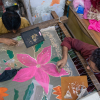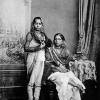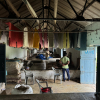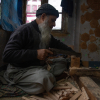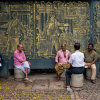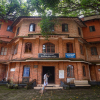On the railway station, the sign read Varanasi. Outside the police station, the sign read Varanasi. On the hospital the sign read Varanasi. On the liquor shop was written Varanasi. In the opium, ganja and charas shop was written Varanasi. In the bookshop where ‘kokashastra’ (sex manual) was openly sold, it was written Varanasi. At the medicine’s store where a crowd jostled to buy pure makardhwaj (Ayurvedic medicine) was written Varanasi. At the clinic of Hakim Haziq-ul-Mulk was written Varanasi. At the pinjrapole (an enclosure for old or sick animals) was written Varanasi. On the cowshed was written Varanasi. On the lunatic asylum, the board said Varanasi.
In the post office, the letters were being stamped one after another: Varanasi, Varanasi, Varanasi; like the stroke of hammer, like the rhythm of the tabla, Varanasi Varanasi, Varanasi.
But when the Traveller asked a wayfarer, ‘Bhai, what town is this?’ His answer was, ‘Banaras’.
The Traveller, who so far was lost and bewildered, suddenly smiled with relief. His dark eyes lit up with old memories. An innocent smile appeared on his parched lips. He was the child who came home to mother saying, ‘Mother, I am here.’ The Traveller had come from far away but there was no sign of fatigue on his face. His home-washed rough garments bore no dirt from the journey. He had no bedding, no trunk, no tiffin carrier, no water pitcher, no lota, no lutia, and no decanter. For some reason, however, it seemed he was carrying a big load on his shoulder.
He wanted a place to stay so he asked a passerby, ‘Brother, there was a sarai here of BhooliBhatiaran?’‘No,’ came the answer, ‘But there is a Muslim musafirkhana.’‘For Non-Muslims, where do they stay?’‘There are several dharamshalas for Hindus.’‘And for those who are neither Muslim nor Hindu?’ The man pointed at a hotel. Outside there was a board, Hotel Varanasi, Varanasi. The Traveller entered wondering why the name Varanasi was written twice. Suddenly he saw a dreadful sight. A black serpent raised to its full height was moving towards him. He jumped out of its way, but was even more surprised to see this ferocious python wrapped around the chest and hips of a half naked foreign woman.
A bearded magician was announcing, ‘Python Memsaab! Python no make fear Memsaab! Take picture, only two rupees.’ The Traveller who did not understand the language thought the bearded snake charmer was attacking the woman with the python. So he lunged forward, grabbed the serpent with both hands and threw it on the ground. The foreigner started shouting in her own language. The snake charmer grabbed the neck of the Traveller, ‘What the hell, old man! You’ve spoiled my work.’ Then there was a glimmer of understanding in his eyes. ‘So you too are a magician!’ The Traveller said, ‘I am not a magician, but what were you doing? This poor foreign woman could have died.’‘Off, you fool!The serpent had no teeth. Memsaab had worn him around her neck only for people to take pictures. Go, get out of our way, lunatic.’
Then he looked at the woman and pointed at his own skull. ‘Memsaab, old man, screw loose, no mind, mad man. Now python make love, memsaab, take picture, only two rupees.’
Now the Traveller was talking to the hotel manager. ‘Can I stay in this sarai?’‘This is not a sarai, this is a hotel.’‘Oh! Now they call a sarai, a hotel? Hmm...I want to stay here.’‘Where have you come from?’‘Well, I stay right here…and I stay so far from here that nobody can understand the meaning of that distance.’
The manager did not understand this at all. Hebegan filling the questionnaire in his register.
‘How did you travel? I mean, how did you come here, by train?’
‘No’
‘By bus?’
‘No’
‘By flight?’
‘No. Sorry, yes. You can consider my journey a flight.’
‘Where is your luggage?’
‘Luggage?’
‘Luggage’
‘Where I live, there is no need for luggage.’
‘So you cannot stay here.’
‘Are you the owner of this hotel?’
‘No, I am the manager.’
‘Who is the owner?’
‘The owner is BhagwanKashiDwarkanathBhanjam.’
‘Then why do you call this a hotel? This is a temple and in Bhagwan’s temple, any traveller can be his guest.’
The manager laughed, ‘But the owner of this place asks for rent. Every room costs forty rupees a day. Do you have so much money?’
The Traveller was angry, ‘Then the owner of this place is no Bhagwan, he is Shaitan, the devil. I don’t want to stay here. I am leaving.’
Saying this, he dashed out.
After he had left, the manager said to the bearer, ‘What lunatics we have to deal with!’
And the bearer said, ‘Sir, he is a dangerous lunatic. I just saw him troubling the American memsaab and he was about to run away after snatching the serpent.’
‘So why didn’t you tell me? If such lunatics wander around our hotel, the tourists will stop coming here.’
He then picked up the phone and dialed … 4068.
2
Now the Traveller was moving in the crowded market place. He was thinking, during my days there weren’t so many people. But I am really happy that my city has become such a lively place. He saw shops of Banarasisaris and silken materials. He began to think…our looms are still turning out such fine cloth. The shops were stuffed with multicolored saris plus bales and bales of many varieties of cloth. He thought…now every woman of my town can wear Banarasisaris. She can wear a lehenga (full length ankle skirt) or shalwar(type of traditional loose trousers) of the best silk. Then he saw woollen materials stacked in some shops. So he thought, this is good stock for winter; all these are signs of progress. In our days, during winters, people wore cotton-filled dagley (jackets).
When he looked some more, he saw people on the road in dirty old torn garments. He could not understand. The shops had piles of expensive Banarasisaris, but the woman outside wore rags with which she was trying to cover herself and her baby. He saw two thin, emaciated labourers pushing a handcart. They too were dressed in ragged kurtas and dhotis (traditional garment worn by men). Nearby in a shop, one Lalaji was warming his hands on a burning charcoal brazier. On the other side, a Maulvi dressed in a warm woollen Kashmiri doshala (shawl) with golden embroidery, with a twenty-yard amama (turban)on his headwas rushing towards the mosque. A clean-shaven young man in a warm woollen English overcoat, tweed suit, woollen socks, muffler and gloves was blowing smoke from his cigarette while walking towards his car. A huge car with a flag passed by and the Traveller saw a glimpse of a white cap. Someone standing by said to him, ‘You sawthe window panes shut on all sides? This is to ward off the cold and prevent the minister from sneezing.’
Then an even larger car stopped at a sari shop. A man got down and walked inside. On his dark chubby fingers, diamonds gleamed, as starsreflected in dirty stinking drain water. Someone asked, ‘Did you recognize him? This is Seth KarorimalPakori Mal. He has made one crore rupees in the black market, out of which he has built a mandir (temple) worth one lakh. He is planning to give a dowry of five lakhs to his daughter, which is why he has come here. Special saris have been made; each one is worth five hundred rupees. You understand?’
The Traveller didn’t understand. All he understood was that the woman standing by the wall was shivering in the cold and the baby in her lap was turning blue.
At this very time a bhajan (religious song) started in the nearby mandir:
‘Jai Jai Ram Krishna Hari,
Jai Jai Ram Krishna Hari.’
Suddenly something went wrong with the Traveller. He started singing loudly along with the bhajan, but this was his own version. People from the market began to collect around him because his voice touched their heart. They had not heard such a voice for centuries. The Traveller was singing:
‘O Bhagwan! Is this your darbar (court)
Where there is endless oppression?
Jokers reside in palaces,
Robbers and thieves indulge in revelry,
Fool is called wise,
Wise is called bumpkin,
One is clad in woollendoshala,
The other stands naked in the market place,
Is this your darbar?
What is this sarkar (master), O Bhagwan?’
Hearing this someone said, ‘He must be a communist.’ Another one said, ‘He seems like a KabirPanthi. These words are like Kabir’s.’ Third one said, ‘No, no. KabirPanthis these days never singKabir’swords.’ The fourth said, ‘I say, he is just mad. Poor man, he is mad.’ Fifth said, ‘What a dangerous mad man, who sings such dangerous bhajans!’ Sixth said, ‘He is only singing, the poor man, he is not doing any harm.’ Seventh said, ‘How do you know? Such words can start a fire.’ Eighth said, ‘Such words are poisonous snakes. There is no antidote to their bite.’
Suddenly, someone said, ‘Look at what the mad man is doing!’ Everyone turned around to see that the Traveller had pulled off the Seth’s shawl and given it to a rickshaw puller who was shivering in a torn shirt and knickers. The minute he got the shawl he quickly peddled his rickshaw and disappeared from sight.
Sethji was still shouting for help when the Maulvi who was returning from the Masjid began shouting, ‘Oh my, oh my doshala, run after the thief, run after him, he has stolen it.’ But the Traveller gave that woollendoshala to the beggar who wrapped her child in it and ran out of sight. Everyone was now looking for the Traveller, but the Traveller had disappeared. The Maulvi’s beard was trembling with anger; he was continuously muttering as if reciting prayers. ‘Oh, mazhar-ul-ajaib, the rascal was here and now he is gone. Oh, mazhar-ul-ajaib, the rascal was here and now he has disappeared.’ Someone said, ‘Daylight dacoity. These are daylight dacoits. Sethji and Maulvi should file a report in the police station. The thief would immediately be caught.’
Another said, ‘He is not a thief. He is a thug. He threw dust in our eyes and disappeared with the shawl.’ The third said, ‘He did not really look like a thug, he looked like a simple old man.’ The second replied, ‘In Banaras, most people look innocent. He was certainly a thug.’ The fourth said, ‘I don’t think he was a thief or a thug, otherwise, he would have himself taken the stolen goods. Why should he have given it to others? He must be mad. He must be a mad man.’ The Seth whose paunch was quivering with anger just as the Maulvi’s beard was quivering with anger said, ‘This madness is very dangerous, if a couple more such mad people appear; our business will totally collapse.’ Saying this, he dialed the phone lying next to him… 4068.
3
Very far from there, the Traveller was wandering around the ruins of Sarnath. Here, neither the Seths or the Maulvis nor the Mantris (ministers) are ever seen. Footfalls on the dust of the past do not make the slightest sound. The Traveller stood a long time before the statue of Bhagwan; the Abhayamudra of Gautam gave him solace and those stone eyes, which had comprehended the world’s pain, kept speaking to him. He felt those carved stone lips smiling at him as if they were saying, ‘Oh Traveller, the road on which you are journeying, we know it well because this was our road as well. But these days, no one walks on that road. Your path has also been abandoned. On the dust of our path, one can see footsteps of a wandering lost soul only after many centuries.’ And the Traveller’s eyes spoke the language of silence, ‘Give me strength, give me peace, Oh, Shakyamuni, after a long time, I have returned.’
Gautam’s lips spoke without moving. ‘You have not returned from anywhere. You never went anywhere. You were asleep in the hearts of the people. Now, you have awakened in their hearts. You will remain here. You are here…everywhere just like I am here, I am there, I am everywhere. We are everywhere. We are in all times. But today, especially, we are here, right here.’
‘But Shakyamuni, I am very pained by what I saw today.’ And Gautam’s eyes spoke in silence, ‘What is pain? What is pleasure? It is nothing. Whatever there is; is our karma, our action. And today, by your action, you have proven that your words contain not only music but also shakti (strength).’ And the Traveller saw the stone eyes smiling at him. Then he wandered towards the BudhMandir. At the entrance he saw marble slabs engraved with names of rich donors; among them was Seth KarorimalPakori Mal whose shawl he had grabbed just today.
‘What is this?’ he asked one of the bhikshus (Buddhist monks). And the bhikshu clad in yellow robes said, ‘These are the names of philanthropists who gave money for the construction of the temple.’ The Traveller mumbled, ‘They did not donate for Mahatma Budh, nor for the mandir, they donated to get their names carved on the marble slabs.’ Saying this, he entered the temple. There he saw that the great soul who gave mukti (liberation) to lakhs and crores of human beings was in an encasing of a yellow metal. The bhikshu spoke, ‘This covering around the statue is made from 8 maunds of gold.’
And the Traveller replied, ‘What a powerful metal this gold is; it can hold a soul like the Buddha in its grip!’ This remark was beyond the understanding of the bhikshu. Then the Traveller looked around and saw the walls were covered with gross paintings showing different scenes of Mahatma Buddha’s life. The bhikshu said, ‘These paintings were made by a great Japanese artist. Mark of his devotion. It took him four years to complete. See that corner; the name and address of the artist!’
A tourist standing by said to the Traveller, ‘Only four years! And the artist was anxious to write his name and address. Just look at the Ajanta and Ellora caves. Two hundred and fifty years for each cave, filled with statues and paintings. Many generations of artists created this eternal art. But not one of them wrote his name or address anywhere. This is true devotion. True art.’ The Traveller listened to this very carefully and then spoke, ‘People work for their name, nobody loves Buddha.’
Meanwhile, he saw the bhikshu standing in a shop selling paintings, statues and books. The Traveller saw another bhikshu who was continuing to prostrate himself before the Buddha statue. ‘But Mahatma Budh had said, ‘Never build my statue.’ He also said, ‘Never prostrate yourself before any statue.’’
But the bhikshu was mouthing some prayer and every time he would throw himself and place his forehead on the ground. The Traveller thought that he was doing some exercise, so he asked another tourist. ‘Is this a mandir or is it a wrestling pitch?’ The tourist said, ‘Shhh!’‘BhikshuMaharaj is worshiping BhagwanBudh statue.’ The Traveller saw that on the cold marble floor, the bhikshu had spread a warm woollen shawl so that his body did not touch the cold floor. Where he placed his hands, there were squares of cloth so that he didn’t have to touch the cold stone. How careful he was of protecting himself! But he was continuously exercising—up and down, on the ground, off the ground. And all the while the mumbling continued. The Traveller thought, this is not a bhikshu, this is a puja (prayer) machine, which performs its routine at a flick of a switch.
He felt that this false devotion was insulting BhagwanBudh; that the bhikshu was mocking Buddha’s pure soul. So he bent down and in one stroke he pulled away the woollen cloth so that next time when the bhikshu prostrated himself, his forehead and body hit the cold hard floor. In one minute, his tapasya (penance),shraddha (faith), and puja were over and the falseness of his ahimsa (non-violence) was exposed. He ran after the Traveller to beat him up. In the meanwhile, the Traveller had lifted the iron gong and with it was breaking the yellow metal encasement around the Buddha statue. He was rescuing Buddha from the golden prison.
Many bhikshus, guards, tourists ran after him but the Traveller disappeared into the thin air. And when his chasers came out of the temple, they saw that the marble slabs pasted on both sides of the door, with names of the donors and amounts of their donations had been shattered by some lunatic in such a manner that no one could read the name of Seth KarorimalPakori Mal nor the amount of his donation to the temple.
‘He is a mad man, Maharaj.’ The bhikshu reported to the manager of the mandir who was writing accounts of the donations in his register. And the guard added, ‘He is a dangerous lunatic. He shattered to pieces the golden encasement of the statue but did not take even one piece with him. He is totally mad!’ The manager of the mandir said, ‘BuddhamSharanamGacchami.’ And his fingers dialed…4068.
4
‘Maharaj,’ a voice was heard, but the Traveller did not turn around to look.
‘Shriman,’ the same voice, but the Traveller paid no attention
The bazaars (markets) were very crowded in the evening. May be this call was for someone else.
‘O, Bhaisaab,’
‘Eh, Mister’
‘Arrey listen,’
‘Arrey you,’
‘Arrey,’
And the last ‘Arrey’ was so loud that the Traveller stopped and turned back. He saw one man dressed in a white kurta, white dhoti, woollen jacket, well-oiled hair, and a mark of sandal on his forehead following him. ‘What is it, brother?’
‘You have arrived in Banaras today, am I right?’
‘You are right. I have always lived in Banaras. But this is the first time I have come to Varanasi.’
‘So let me show you the VishwanathMandir.’
‘What is there?’
‘Oh, there you will get darshan (auspicious sight) of Bhagwan!’
‘Why? Isn’t Bhagwan here also? Has someone imprisoned him there?’
‘No, No! There is a statue of Shiv Bhagwan. You can do darshan, you can perform puja.’
The Traveller said, ‘If worshiping a stone gets you Bhagwan, then why not worship the millstone? It grinds the grain and fills hungry stomachs.’
‘Oh no, this is not a stone statue, it is a gold statue. There are twenty six maunds of gold encasing on the steeple of the mandir.’
‘I don’t want to see Bhagwan’s statue, neither in stone nor in gold. I see Bhagwan everyday, every moment.’
The man with a greasy hair thought the old man was making a fool of him. So he said, ‘Why uncle? Where all have you seen God? ‘
The Traveller replied, ‘I saw Bhagwan begging in the gali (lane), I saw Bhagwan in a torn shirt shivering in the cold, I saw Bhagwan in the tavern. He is in the wine. He is in the bhatti (furnace). He makes wine, he serves wine, he drinks wine, he is the container, he is the cup and he is the intoxicated.’
While he was speaking, the greasy haired one walked away in confusion. He was thinking, ‘Damn, I got stuck with a lunatic.’
When the Traveller walked a short distance, he saw another panda (a brahmin who acts as the superintendent of a particular ghat or temple) who said, ‘Maharaj, it seems you have just arrived on this sanctified land. Come, let me take you for a dip in the holy Ganga.’
The Traveller asked, ‘Why? What will happen if I take a dip in the holy Ganga?’
‘Your sins of a lifetime will be washed away. Once you bathe in the Ganga, you will go straight to paradise.’
The Traveller thought for a moment. Then he said, ‘Tell me Shriman, whoever bathes in the Ganga, does he really go to paradise?’
The panda said, ‘Yes, yes, he goes straight to paradise.’
The Traveller said, ‘Then all the dhobis (washermen) and all the turtles must go straight to paradise.’
‘Poor man, he is mad,’ the panda thought and wandered off in search of another victim.
Wandering around, the Traveller reached a shamshanghat (cremation ground). There he saw piles of wood on which dead bodies were burning while ghee (clarified butter) and oil were being poured over them. The flames were burning bright. The brahmins were reciting shlokas (Hindu religious verses). Relatives of the dead were giving alms to them.
The Traveller asked a man who was probing the burning log, ‘How are things, brother?’
‘Business is very down these days brother.’
The Traveller asked, ‘What business?’
‘This business of burning the dead. I don’t know what has happened. People are not dying so frequently nowadays. Ten years ago, one hundred and fifty corpses arrived everyday. Now there are hardly twenty-five to thirty. In the old days, people from all over the country used to come here to die. This is the age of disbelief; many people prefer to die in their own homes.’
The Traveller showed sympathy, ‘Very sorry brother. But you must trust Bhagwan, He looks after everyone.’
Suddenly the Traveller saw a lone old man carrying in his arms a body wrapped in a shroud. There was no one to offer a shoulder for this arthi (the act of carrying the dead on one’s shoulders or a wooden platform). The Traveller went to the old man and said, ‘You are tired. Give me the dead body.’
The old man just cried. He handed the dead body to the Traveller and said, ‘Be careful. This is my one and only son.’ He used ‘is’ because he could not say ‘was’. They both reached the ghat, where in an iron enclosure there was a pile of wooden logs.
A Panda rushed at them shouting, ‘How did you people come here? This is the place of cremation for rajas and maharajas(royalty). It cost five hundred rupees to cremate anyone here.’
‘Five hundred rupees?’ the Traveller repeated. ‘Has death become so expensive?’
‘Yes, of course. Do you know this wood is sandalwood? It’s procured only for rajas and maharajas. Go on the other side of the ghat.’
But on the other side, there were another set of gatekeepers, guardians of the palace of death.
‘It will be forty rupees for the wood. Hand over the money,’ said the first person.
‘Five rupees for the ghee,’ the second stretched out his hand.
‘Five rupees offering for the Pandit,’ the third opened his fist.
‘Fifty rupees all together,’ the fourth spoke the total.
‘Plus one and a quarter rupees to the contractor.’
‘Contractor?’ The Traveller was amazed. ‘Has anyone taken the contract of death?’
‘Yes, without giving him one and a quarter rupee, no one can be cremated here.’
‘Fifty one rupees and twenty five paisa.’
The third said, ‘If you don’t have the money get out of here.’
The fourth struck the ground with his stick, ‘Hurry up, this is business time.’
The old man whose eyes were raining tears said to the Traveller, ‘I have nothing, whatever I had, I spent on his treatment.’
Suddenly, a rich man’s dead body arrived. Hundreds of people were following with a band, flowers and garlands, it looked like a barat (part of a wedding) procession.
The contractors of death ran off in that direction. Only three people were left, alone:
The Traveller
The old man
The old man’s young son’s corpse
The Traveller saw that on a large pile of wood, a pyre was burning; there was no one near the pyre, because everyone had gone to the wedding-band-corpse. He thought for a moment and then quietly moved towards the burning pyre and placed the old man’s son’s body on it. In a few minutes, instead of one, two bodies were burning.
The old man said, ‘Thank you brother,’ and started crying uncontrollably. Hearing the sound of his wailing, the contractors of death ran back. When they saw that an extra dead body was burning without paying their dues, they picked up their sticks.
‘Who dared to place this body without permission?’
‘Me,’ the Traveller said.
‘So hand over fifty-one rupees,’ the first said.
The second reminded, ‘And twenty five paisas.’
‘We don’t have the money,’ the Traveller said.
‘Then we will take the body and throw it in the river.’
Very gently the Traveller said, ‘He is dead now and will be dead then. It will not make a difference to his spirit whether he is burnt or not. But his old father will be distraught.’ Then a note of hardness crept into his voice, ‘And that I will not allow.’ He stood between the pyre and the contractors of death.
‘Old man, we will throw you in this fire.’
‘Do that. Now I am free of any fear of burning, drowning or death. But remember I will drag at least one of you with me into these flames.’
The man with a stick was just about to move towards him when somebody from the crowd shouted, ‘Don’t go near him. He is a mad man and a dangerous one at that. It is he who yanked off the woollen shawl of Seth KarorimalPakori Mal in the middle of the market. And now we hear he went to Sarnath and broke the statue of Bhagwan Buddha. The police and the asylum keepers are looking for him all over the town.’
Another one from the crowd nodded agreement. ‘You are right brother. I have heard the same. You can never say about mad men; he may jump into the fire and drag someone along. We hear that the police dogs are on his trail.’
The stick wielder moved back and the body of the young man was cremated. When the flames subsided, they saw that the mad man had disappeared and the old man was standing alone probing the ashes.
‘Come on, let’s go and tell the police thana (station) that the mad man is somewhere here in this vicinity.’
The Station House Officer listened very carefully to their report. He picked up the telephone and dialed…4068.
5
It was a winter night, the stars in the black sky were twinkling as if they wanted to bend down to see what was happening on the earth. On the cold deserted street, hound dogs and police were looking for the mad man. The man, who, in one day had turned the town upside down.
In a deserted lonely mandir, the priest was shutting the gate when he saw a shadow.
‘Who is it?’ he said in a loud voice because he was scared.
‘I am a traveller, I need shelter for the night. If you permit me, I will lie down in the mandir.’
‘What is your caste?’
‘Maharaj, my caste is human being!’
‘We don’t know that caste. What is your religion? You are a Hindu, aren’t you?’
The Traveller thought for a few moments and then said, ‘No, Maharaj, I won’t lie, I am not a Hindu.’
‘Then what are you?’
‘Human being.’
‘Then get out. Search for a temple of human beings,’ and the Traveller left.
At the masjid (mosque), the mulla (Muslim religious leader) was going to his room after isha (nigh-time) prayers when he saw a shadow on the wall.
‘Who is it?’
‘It’s me, a traveller.’
‘What do you want?’
‘Refuge for a night, I am very tired, Maulviji.’
‘Who are you? Muslim?’
Once again the Traveller took a few moments. ‘No, the truth is that I am not a Muslim.’
‘Then what are you?’
‘Human being.’
In response, the mulla shut the door on his face. By now it was night, dark, and silent. The air was icy cold. There was one lone Traveller; a Traveller without a shelter. Far off one could hear the sounds of hound dogs. In the light of the stars, a white structure became visible. Next to it a few people were sitting by the fire.
‘What is this building, brother? It looks like a masjid on one side and a mandir from the other.’
‘This was a masjid and a mandir both. It was made during the time of Emperor Akbar so that Hindus and Muslims, people of all religions could say their prayers in one place. Then Aurangzeb broke it and made it into a masjid. Then some raja turned it into a mandir.’‘And what is it now?’ the Traveller asked. ‘Now it is neither mandir, nor masjid, it is nothing.’
‘For someone like me who is everything and nothing, who is everywhere and nowhere, for me this is the right place.’
He was still outside the building when the sounds of the hound dogs came close, very close.
6
Inside the thana, the sub inspector police asked, ‘You, old man, your name?’
The Traveller spoke his name.
‘What do you do?’
‘First I was a weaver which you big people call a julaha. I used to weave cloth. With the wrap of love and the woof of knowledge, I tried to weave a chador (blanket) of truth. But my loom has long since broken. I came to look for it thinking maybe someone found it and was now doing my work. But you people gave me no time.’
‘He is really mad,’ the Sub-Inspector said to his havaldar.
‘We will send him immediately, otherwise, who knows what he will do at night.’
Then he picked up the phone and dialed…4068.
From the other side came, ‘Hello. This is the lunatic asylum.’
The Sub-Inspector said, ‘Listen, that Thug of Banaras has been caught. But he is not a thug at all. The old man is a lunatic. We are sending him immediately. Grateful if you can admit him now.’
From the other side came the question, ‘Name? What is his name?’
The Sub-Inspector said, ‘Name is Kabira.’ And hung up the phone.
But the Traveller had left.
(Translated by Syeda Saiyidain Hameed)


